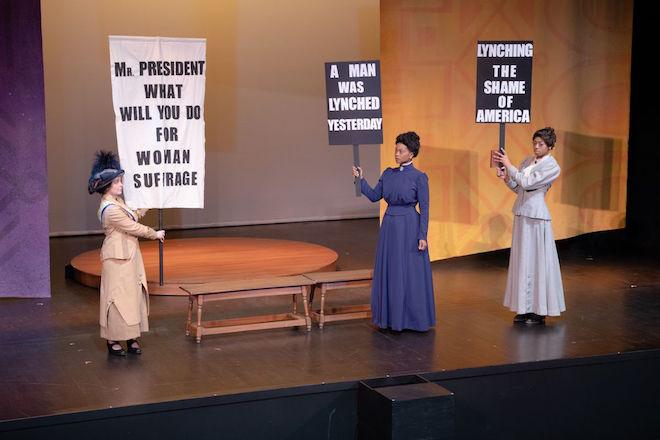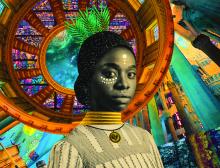Grant Spotlight: StageOne Family Theatre's Production of Lawbreakers!

Megan Massie, Ebony Jordan, and A.J. Baldwin portray Alice Paul, Ida B. Wells, and Angelina Weld Grimké in a pivotal moment where the inequality in the women’s suffrage movement comes to a head. Photo courtesy of StageOne Family Theatre
Playwright Diana Grisanti has vivid memories of seeing plays at StageOne Family Theatre in Louisville, Kentucky, as a child, including Number the Stars, Tuck Everlasting, and The Best Christmas Pageant Ever. So she jumped at the chance to write a new play for StageOne about women’s suffrage, which premiered on February 1, 2020, with support from the National Endowment for the Arts. The production, which also featured an all-woman creative team, was part of the agency’s call for projects that celebrated the centennial of the passage of the 19th amendment.
“There’s a reason I remember going to see plays at StageOne when I was a kid and not, you know, the day I learned the Pythagorean theorem,” said Grisanti, who is still based in Louisville. “The arts have the power to lift up lessons from our history books and put them in three dimensions, and inject them into the brains and memories of the next generation.”
With her new work, Grisanti hoped to not only make the history of the suffrage movement memorable and alive, but to show its relevance to young people today. Lawbreakers! (A Fast and Furious History of Women’s Suffrage) focuses on two teenage step-sisters in modern-day Louisville, Maya and Kiara, whose differences have made for a fraught relationship. While Maya is studious and interested in history, Kiara is apathetic about school and the political process in general. The two girls travel back in time to the 1851 Akron Women’s Rights Convention in Ohio, before zipping to other milestone events (and continents) important to the suffrage movement.
When first approached about writing the play, Grisanti said she immediately knew that she wanted to dig beyond well-known white suffragists like Susan B. Anthony and Elizabeth Cady Stanton, who are perhaps the two women most likely to be learned about in school. “I don’t envy people who write history textbooks,” she said. “You have to simplify, you have to boil things down, and you absolutely have to leave stuff out. For any paragraph in a history book, probably 100 plays could be written about all of the nuances that glimmer out from that paragraph.
Lawbreakers! enlarges those glimmers by focusing on the role played by suffragists of color such as Sojourner Truth and Ida B. Wells, as well as on the intersections between the labor and suffrage movements. The sometimes overlapping, sometimes conflicting voices of various groups reveal a more complicated historical narrative than is often taught in school, and shows how a movement that aimed to empower women was in many ways marked by the same inequalities and tensions as society at large.
“Part of what we see as our responsibility as a theater is not just to tell the stories people want to hear, but to tell people the stories that they need to hear,” said Andrew Harris, producing artistic director at StageOne. Harris said that student matinees make up 95 percent of the theater’s audience, which presents the theater with a unique opportunity to complement what children learn in the classroom. By the end of its run, Lawbreakers! was seen by 10,000 middle and high school students from Louisville’s minority-majority school system, 2,800 of whom saw the production free of charge. “It’s important that we put information out there that helps us learn, understand, and navigate the world around us,” he said.
Lawbreakers! accomplishes this by showing a direct link between the history we read about and the lives we lead today. The experiences of Maya and Kiara, who are Black, not only show that the battle for gender and racial equality remains far from over, but that seeing oneself reflected in history—as Maya and Kiara do during their Bill and Ted-style journey—can be an empowering, motivating discovery.
“I haven’t seen a lot of stories that feature Black girls and specifically talk about the different things that happen to them in their world,” said Lawbreakers! director Sydney Chatman. Chatman has taught theater in Chicago’s charter school system for 17 years and noted, “I know [young people] well enough to know that when we tell their stories, we honor their voice and we make them feel as if they are a part of the conversation.”
Regardless of their background, many young audience members also likely saw themselves reflected in Kiara’s feelings of disenfranchisement and apathy. Historically, young people in the United States vote at lower rates than any other age group. According to the U.S. Census, less than 50 percent of people ages 18-29 voted in the last presidential election, and only 36 percent voted in the 2018 midterm elections—which itself was an historic increase from previous midterm elections.
One of the goals of Lawbreakers! is to cut through these feelings of disenfranchisement. By showing how hard so many women fought to secure the 19th amendment, Grisanti hoped to instill young women with a sense of their own history, and to show young men that “women’s problems are human problems.” Rather than take voting for granted, Lawbreakers! aims to show that exercising this hard-earned right is an act of political power of historic magnitude.
Judging from audience feedback, many took this message to heart. As part of every performance, the audience is asked mid-scene whether anyone needs a voter registration card, and one young person is then promptly handed a card by an actress onstage. Harris said that in performance after performance, this episode was met with enthusiastic cheers, as young people applauded their peers for taking a step toward voting.
Both Harris and Grisanti said that they have heard from students, teachers, and parents about how the play has motivated them or their children to take political action, whether it’s writing to their representatives, donating to political candidates, or registering to vote. Even Chatman was empowered by the play. While she didn’t vote in the last general election, due in part to her frustration with the Electoral College system, she said working on Lawbreakers! has inspired her to cast her ballot in November by helping her “think about my heroes who came before me, who fought for our ability to vote,” she said. “Taking on my civic duty does affect who comes after me. [This play] reawakened my responsibility and gave me this sense of wanting to vote again.”
For Harris, it’s this type of reaction that classifies a production as a success, more so than any sort of box office number. “When you can get a theater of 600-plus middle school and high school kids that sit there in rapt attention watching the story you’re telling, and then you stand out in the lobby and listen and they can’t stop talking about the experience they had—that’s how I know we’ve been successful,” he said. “How empowering for our young people to walk away going, ‘Oh hey, I didn't know that,’ or, ‘Look at what they did. I can do that. That can be me. I have a voice. My voice matters.’”
As we celebrate Women’s History Month this March, the National Endowment for the Arts will shine the light on some phenomenal women, past and present, through the agency’s blog, podcast, and social media channels. While the stats may continue to be disappointing in terms of equity, we believe that as we work to address those disparities it’s also important to celebrate the impact women have made and continue to make in the arts. From Phillis Wheatley, an enslaved woman who was also one of the best-known poets in pre-19th-century America to dancer and choreographer Martha Graham, whose work lives on not only through her dancers but through the company’s venture into mixing dance with technology, we’re celebrating stories of women who, to borrow from Maya Angelou’s famous poem “Phenomenal Woman” have fire in their eyes and joy in their feet.
This article originally appeared in the 2020 American Artscape magazine issue, Celebrating the Centennial of Women's Suffrage.





